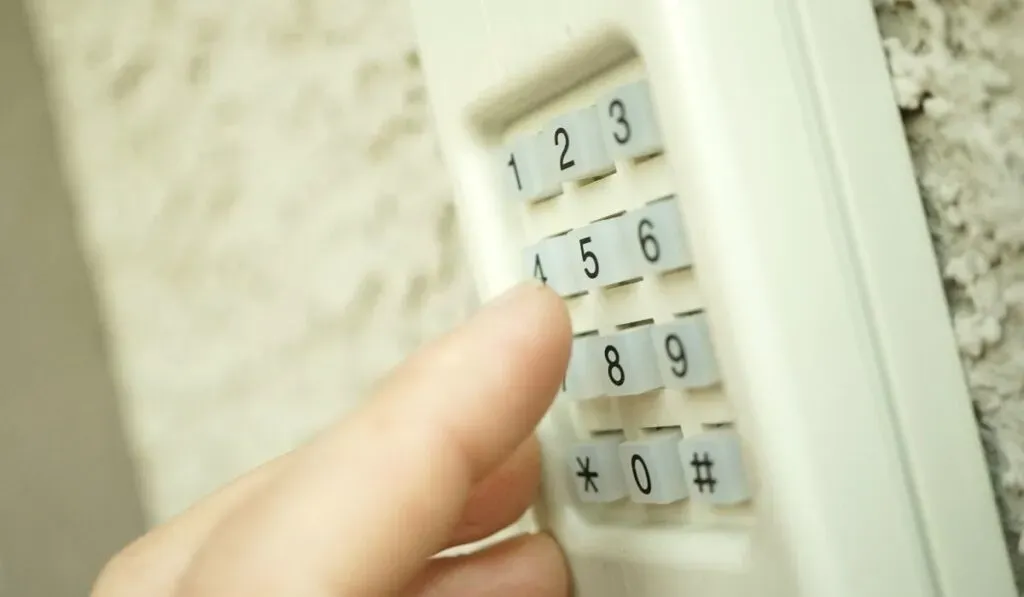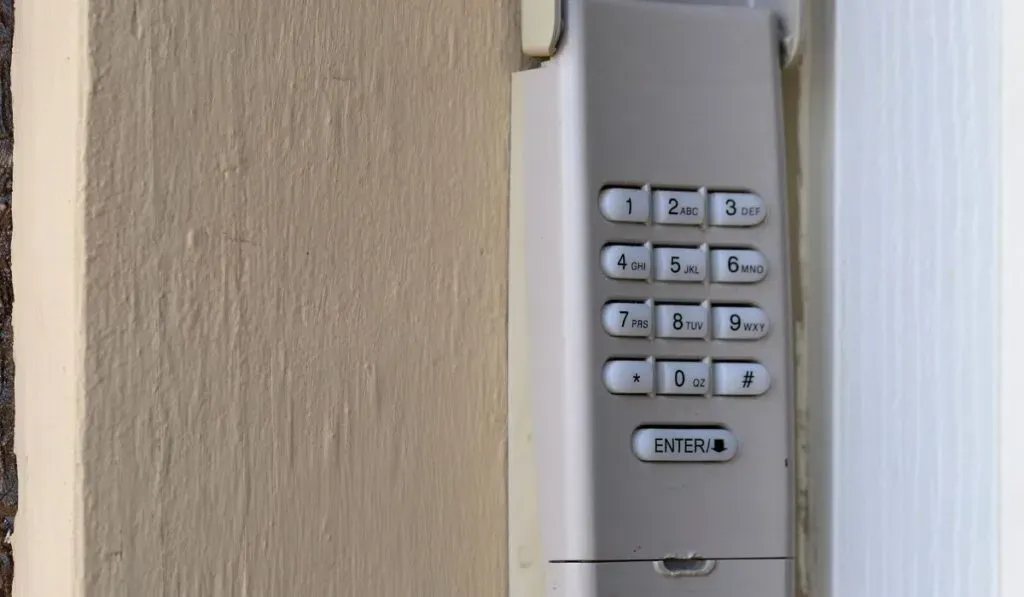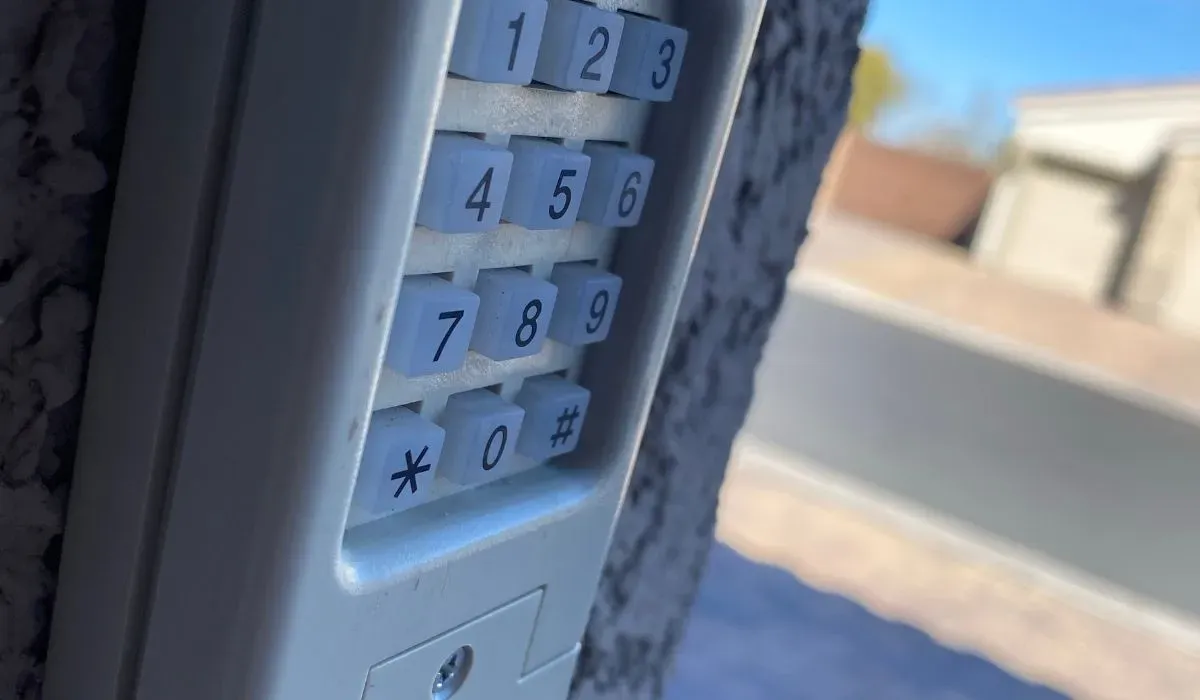A garage door keypad not working in cold weather is a common issue during winter, often caused by low temperatures affecting keypad batteries or wiring. Gulliver Garage Doors offers helpful winter maintenance tips to prevent garage door problems and keep your keypad functioning smoothly despite the cold weather.
Understanding Why Your Garage Door Keypad Fails in Cold Weather
Cold weather can mess with how your garage door keypad works. When it gets really cold, several things cause problems. Knowing what happens helps you keep your garage door working right.
Sub-zero Temperatures and Their Impact on Keypad Components
When temps drop below zero, parts inside the keypad don’t like it much:
- Battery Performance: Batteries lose power faster in cold weather. Alkaline ones, which are common, drain quickly. Lithium batteries do better but still have trouble sometimes.
- Keypad Electronics: The electronics inside the keypad only work well within certain temperatures. Below that, buttons may not respond or take longer to react.
- Moisture Ingress: Cold air often has moisture that can get inside the keypad. If it freezes there, it might cause short circuits or rust over time.
Common Symptoms of Cold-weather Keypad Malfunctions
You can tell when cold weather is messing up your keypad by watching for these signs:
- Keypad Stuck in Cold: Pressing keys might do nothing if freezing affects the inside parts.
- Buttons Stuck: Ice or thickened lubricant from low temperatures can make buttons stick physically.
- Key Malfunction: Sometimes, some keys won’t work while others do. This points to temperature problems affecting certain components.
Knowing these issues early lets you fix things before they get worse during the winter months.
Troubleshooting Your Frozen Garage Door Keypad
When your garage door keypad stops working in cold weather, it can be hard to figure out why. The buttons might not respond, signals could be slow, or it might just quit working altogether. These problems often come from weak batteries, moisture inside the keypad, wiring problems, or damage to the circuit board, made worse by freezing temperatures.
Cold weather slows down battery chemistry and causes water to form inside the keypad. This water can cause rust on circuit boards and wear out the membrane switch faster. Frozen wiring can also cut power flow.
Here’s how you can check:
- See if pressing buttons makes the lights come on.
- Listen for any clicks that show it’s sending signals.
- Check if batteries are weak or old; replace them.
- Look for frost or moisture around the keypad housing.
- Test wiring if you can get to it.
Knowing whether the battery is bad or there’s internal damage helps you fix things faster.
Battery Issues: Alkaline vs. Lithium for Cold Weather Performance
The kind of battery you use matters a lot when it’s cold outside. Regular alkaline batteries lose power fast once temps drop below freezing (0°C/32°F). Their chemical reactions slow down and give less voltage.
Lithium batteries work better in cold weather. They keep steady voltage even at -20°C (-4°F) or colder. That makes them a smart pick for garage door keypads that face rough winter weather.
Moisture Ingress and Membrane Switch Degradation
Water sneaking into your garage door keypad causes many winter problems. When warm air hits cold surfaces, moisture forms and seeps through tiny gaps around seals or screws.
Over time, this moisture causes corrosion on metal contacts inside the membrane switch — that thin layer under buttons that registers presses. It also harms printed circuit boards (PCBs). This results in sticky keys that don’t work right or weird behavior like random opening and closing.
You can stop moisture by:
- Mounting the keypad tightly with good seals
- Using dielectric grease on contacts before putting them together
- Checking seals regularly and swapping out cracked parts
- Putting the keypad where it won’t get soaked, like under a cover
Membrane switches age faster with freezing and thawing, plus trapped water inside units not built for harsh weather. After a few winters, worn-out keypads need replacing to keep things reliable.
Signal Interference and Range Issues
Sometimes a frozen garage door keypad isn’t broken but has weak wireless signals. Cold makes this worse. Metal nearby can block radio waves between your keypad and opener receiver.
Lower temps also mean weaker signals because batteries supply less power, like we talked about earlier. Snow piling up on antennas cuts signals too, causing spots of failure even if the hardware looks fine inside.
Try these tips to boost signal strength:
- Clear snow from the keypad and opener antenna often
- Move keypads away from metal things like gutters or siding
- Use signal extenders made for remotes if the distance is too far
If responses get weird only on cold days, but everything else looks okay, think about signal interference along with other issues.
Check each of these common causes one by one—battery health, especially switching from ithium to alkaline; stopping moisture leaks; watching membrane switch wear; and cutting down signal troubles—and you’ll get your garage door keypad working again through tough Canadian winters.

Quick Fixes and Immediate Solutions
Cold Fix Quick Hits: Simple Steps for Immediate Relief
If your garage door keypad isn’t working in cold weather, try these quick fixes to get it back fast:
- Replace batteries ahead of time before the cold hits. Batteries die faster in cold temps.
- Test batteries often with a multimeter or battery tester.
- Use lithium batteries instead of alkaline ones for better cold-weather performance.
- Keep the keypad dry and protected from moisture that can cause trouble.
- Put dielectric grease on contacts to stop corrosion from humidity.
- Make sure the keypad is mounted tightly and weatherproofed.
Cold weather slows chemical reactions inside batteries. That makes the voltage drop and causes the keypads to act slowly or quit. Switching to fresh, cold-proof batteries early helps you keep access during tough winters.
Replacing the Battery
Most keypad problems in cold come from battery issues. Here’s what you need to know about swapping them out:
Alkaline batteries lose juice fast when freezing. Lithium batteries hold up way better because their chemistry works well in low temperatures.
Battery replacement tips:
- Pick good lithium AA or AAA cells made for extreme cold.
- Take out old alkaline batteries quickly; they drain fast in the cold.
- Check your opener’s manual—some, like LiftMaster 878MA, X say which battery to use.
- Keep spares inside a room temperature till you need them.
Changing to lithium keeps your keypad working longer and steadier even below zero degrees.
Checking for Obvious Damage
Look over your keypad closely for physical damage that might make cold problems worse:
- Check for cracks in the casing that let moisture inside. When water freezes inside, it can cause corrosion and button troubles.
- Feel if buttons are worn out or sticky. Cold plus frost makes membranes age faster.
If the keypad is cracked or worn badly, you may need a repair or a new unit if cleaning doesn’t help.
Testing Keypad Functionality
See if your keypad still works despite the cold by testing it:
- Press every button firmly. They should respond right away, not stick or lag.
- If some keys fail now and then, moisture or electrical faults might be the cause, worse in low temperatures.
This test tells if drying helps or if you’ll need deeper fixes before reprogramming or replacing parts.
Temporary PIN Code Solutions for Quick Access
When your usual code stops working because temporary PINs expire or buttons break, try these emergency options:
- Some systems let you set temporary PINs remotely with smartphone apps on compatible openers like Genie GK-R.
- Or use the manual release lever on your opener as backup while you fix electronic issues indoors, away from freezing weather.
Always check your brand’s instructions about handling expired codes in winter without risking security.
Using Alternative Access Methods
If your keypad fails often during big cold snaps, other entry methods can help:
- Wireless keyless entry systems use fobs that talk directly to receivers inside garages. These fobs don’t mind outdoor temperatures much because receivers stay safe indoors.
- You can also install keyless entry pads inside near doors. This avoids cold exposure but needs wiring changes done by pros who know local climate needs.
Reprogramming Your Keypad: A Step-by-Step Guide
Resetting your keypad can fix glitches caused by power dips in cold weather. Here’s a simple way (check your manual too):
- Find the reset button, usually behind cover plates near wires.
- Hold reset till the LED flashes (about 10 seconds).
- Enter the default master code from the manual, then set a new PIN as prompted.
- Test all buttons outside once done to make sure ice isn’t blocking signals.
- For models like LiftMaster 878MAX or Genie GK-R, look up online manuals with exact reset steps for each device type.
Keypad Button Issues and Stuck Keys
Cold weather can make garage door keypad buttons stick or stop working properly. When moisture freezes inside, the buttons get stuck. Also, membrane switches can age faster in cold temperatures. To fix this, wipe the keypad gently with a soft cloth and some isopropyl alcohol. Don’t use strong chemicals—they might damage the membrane switch.
If you can take off the keypad cover, clean the electrical contacts carefully. Use a cotton swab dipped in alcohol to remove dirt or corrosion on the contacts. After cleaning, put a thin layer of dielectric grease on them. This keeps moisture out and helps stop keys from sticking again.
If keys still stick after cleaning, check if the membrane switch is worn out or broken. Older keypads often have this problem. In that case, you might need a pro to repair it or just replace the keypad to keep it working well in cold weather.
Addressing Damaged Wiring: Inspection and Repair Strategies
Wiring problems cause many garage door keypad failures when it’s cold. The insulation on wires gets brittle in low temperatures. This can lead to cracks or breaks that stop signals.
Look over all wiring for signs of damage like cracks, frays, or corrosion near connectors where water can sit. Corroded contacts make electricity flow worse. Use an electrical contact cleaner made for delicate parts to clean them gently.
After cleaning, put dielectric grease on any exposed connections to keep corrosion away. If you find broken wires, replace those parts quickly. Use electrical insulation made for outdoor use so your system stays safe and works through winter.
Outdated Keypads and Replacement Considerations
Changing batteries before they die matters because alkaline ones lose power fast in freezing weather. Lithium batteries work better when it’s cold, like during Canadian winters.
Upgrading old keypads gives you these perks:
- Better battery life with lithium
- Stronger against harsh weather
- Works with smart home systems for remote control
When picking a new keypad, check these points:
- Weather resistance ratings (like IP codes)
- How easy it is to install
- Simple user interface
- Works with your current opener (some good ones are LiftMaster 878MAX or Genie GK-R)

Weatherproofing Your Keypad for Enhanced Protection
Keeping your garage door keypad safe from rain, snow, and ice helps it last longer. Put on a weatherproof cover made just for keypads. It stops moisture from getting inside and causing trouble in cold weather.
Choose covers built tough with tight seals around edges (that’s keypad weather sealing). They should also let you reach buttons easily when needed.
- Run wiring through sealed tubes or conduits
- Seal all cable entry spots to block drafts and water
These steps keep your keypad working even in bad Canadian winters and cut down on how often you need repairs.
Winterizing Your Garage Door System: Preventive Measures
Cold weather causes garage door problems in winter, especially for keypads left out in the open. When moisture gets inside or freezing temps hit, keypads might stop working right. To avoid this, mount your keypad with waterproofing in mind. Weatherproof covers help keep snow, rain, and ice buildup away.
Ice on garage door seals can block movement or cause damage. Check seals often for ice buildup. Clear it quickly to keep your door moving smoothly in winter.
Garage door opener maintenance in winter is a must. Make sure no dirt or moisture sits on parts that could freeze or rust. Fixing cold-weather garage door keypad issues early saves money later and keeps things working all season.
Lubrication and Maintenance for Cold Weather Operation
Lubrication helps your garage door work well when it’s cold. Pick a low-temperature lubricant made for chilly places. These won’t get thick or freeze up.
Use dielectric grease on keypad electrical contacts. It stops corrosion from moisture ingress and helps signals pass better. This small step helps your keypad last longer because cold can wear it down fast.
Before winter comes, lubricate hinges, rollers, and tracks. This stops parts from getting stiff as metal shrinks or expands in cold weather.
Regular Battery Checks and Replacements: A Proactive Approach
Battery life drops big time in freezing temps. You need to test batteries often to see if they still work well.
Don’t wait for batteries to die—replace them ahead of time. That way, you don’t get stuck locked out when it’s cold outside.
Here’s what to know about batteries for a garage door keypad:
- Alkaline batteries are common but lose power fast in cold weather.
- Lithium batteries cost more but last longer in low temperatures.
When DIY Fails: Recognizing When to Call Gulliver Garage Doors
If your garage door keypad stops working when it’s cold, even after some tinkering, you might need a pro. Cold weather can mess up the keypad circuit board or cause problems with electrical insulation. Moisture sneaks in and can damage the tiny parts inside. This leads to the keypad acting weird or not working at all.
Here are signs to call for help:
- Keypad won’t respond after changing batteries
- Works only sometimes when it’s freezing out
- Garage door opener sensors don’t seem right, affecting remote use
- You see rust or wear inside the keypad
Trying tricky repairs yourself might make things worse. Pros have the tools and know-how to fix these winter garage door problems safely.
Your Local Experts for Garage Door Repair!
Gulliver Garage Doors knows how cold weather can mess with wireless keyless entry systems and smart garage keypads. Our expert garage door techs fix problems caused by chilly temps. They use stuff like dielectric grease and better electrical insulation to keep things working.
We also help when you can’t get into your garage during an emergency because the keypad won’t work in winter. We install power backup systems that keep your opener running when the power goes out due to bad weather.
Picking local experts means faster help and service made for Canada’s cold climate. We fix, maintain, and upgrade keypads that work with popular models like LiftMaster 878MAX or Genie GK-R.
If your garage door keypad acts up in cold weather, give us a call before small issues turn into big ones.
Frequently Asked Questions
Q: Why does my garage door keypad show freezing symptoms in cold weather?
A: Cold temperatures reduce battery output and cause moisture buildup. This leads to button sticking and keypad malfunction.
Q: How do I prevent keypad moisture damage during winter?
A: Use weather-resistant keypad housing, apply dielectric grease on contacts, and install waterproof enclosures to block moisture.
Q: What are the signs of keypad circuit board issues due to cold?
A: Look for unresponsive buttons, erratic signals, or complete keypad failure in sub-zero temperatures.
Q: How can I improve my garage door keypad’s signal range in cold climates?
A: Clear snow from antennas, avoid metal obstructions, and use signal extenders designed for outdoor keypad use.
Q: What is the best battery type for keypad battery replacement in winter?
A: Lithium batteries provide longer life and better performance in low temperatures than alkaline batteries.

